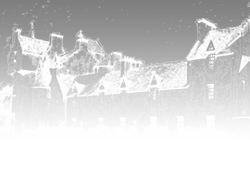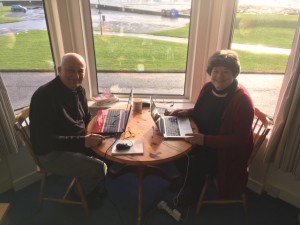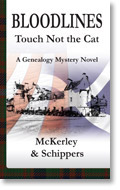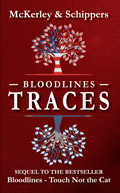Bloodlines Big Time Bloopers… Take 27
Click here for the Bigtime Blooper podcast
3 minutes 9 seconds
A home made recording by Tom and Ingrid during their book 3 (untitled as yet) writing spur in Scotland; January 2019. (with a wee apology for the sound quality. It was a sponteneous act)
Location: Bargany’s B & B, Troon
Continue reading for the full text:
Tom narrating: One of the joys of writing as co-authors is that you get to laugh at your own writing mistakes. Three examples spring to mind that left us simply in stitches; serious laughter, tears in our eyes, hiccups, The Lot!
Here’s example blooper number 1:
Ingrid narrating: We are in the habit of reading finished chapters out loud to each other, so the other author can listen intently for errors, sentence structure and so on.
It so happened that Tom was reading out a chapter where character Laird Gordon Macpherson was explaining over dinner what had happened to the gamekeeper’s son, Alexander Stewart. Suddenly, halfway a sentence Tom stopped, looked at me if he’d seen a ghost and said:
“Ingrid, this is not right; this can’t be happening’
‘Why? Ingrid asked, a bit annoyed (sounding like Cathy the cop) What’s up? It’s good! I heard nothing wrong!
‘ Except for the fact Gordon can’t be making this speech’ Tom replied. ‘He died two chapters ago”.
Ingrid narrating: Bloopers Number 2.
Another blooper that got us into a fit involved a chapter about Laird Angus Macpherson. Whenever we read a chapter out loud we very much follow the exact spelling without thinking too much about what we literally read. All went fine until I came to a line where a typo had left the G out of Angus. So here I was; reading out very convincingly what supposedly this Anus Macpherson had said. We laughed till our jaws ached.
Tom: ‘Those Scottish lairds are so clever! I’ve heard of the expression, talking out of your backside but we sure had to correct this error.’
Ingrid narrating: A third example of what can go wrong is when we were reading out a long stretch of narrative on Alexander Stewart; just to see if the chronological order of events had been put in the right chapters.
Tom continuing: Alexander’s Journey was quite arduous, leaving Ballindalloch, visiting the Lagmore Stone Circle, boarding a train; sailing across the Atlantic. It was when we were reading all these adventures in one go that we discovered Alexander desperately needed a doctor.
While writing, we had failed to notice that if Alexander’s stomach churned once, it gurgled twice, it heaved three times and his belly ached at least four times, he felt sick, his skin was sticky and moist, he must have a fever, his throat was sore and as the Scots would say, he had ‘the dry boke’. How he ever made to the other side of the ocean in one piece was basically a miracle.
Ingrid: And we never used the expression ‘his stomach churned’ ever again.
With Family History Greetings,
Tom and Ingrid
••••••••
It all started because authors Tom McKerley and Ingrid Schippers, each in their own way, have an interest in family history. Tom researched his ancestry going back to northern Ireland circa 1780, while Ingrid has a natural and partly professional interest in people’s life stories
In 2009, following a conversation between Tom and Ingrid on how ancestry influences who you are today, Tom came up with a synopsis about a feisty American cop, Cathy Macpherson who gets lured to the Scottish Highlands where her husband travel writer David Stewart wants to find out what prompted his great great great grandfather, Alexander Stewart to leave Ballindalloch Castle in 1895. In turn this inspired Ingrid to create the lifetime of Victorian character Katherine Macpherson, daughter of the Laird of the estate where Alexander was born.
It is all pure fiction, yet to the authors it became very real. They felt the characters tugging at their sleeves as if they were real and wanted their life stories told. Sometimes it seems to be the story that seeks the storyteller.
In these blogs and podcasts, Ingrid and Tom recount the high’s and low’s they’ve encountered du quest of writing.
To listen to the recorded introduction click here: introduction bloodlines blog








